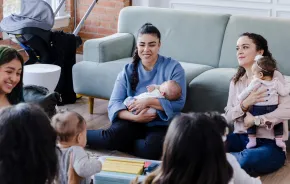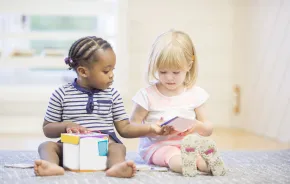If there’s one constant in parenting, it’s change. As kids grow up, there’s a first time for just about everything. Many kids in their tween years want to start doing things they’ve never done before, and they want to do them on their own or with their friends, and not you. Kids this age push for increased independence, even if their parents wish some of these “first times” could wait until a later date.
Some typical tween “firsts” include: first cell phone, first time going to the mall or a movie with their friends, first dance, first time away from home (such as camp), first concert, first boy/girl party, and first time riding a bike to a local store alone.
Ready — or not?
So how do you know when your tween is old enough? Is she really ready to do more things on her own? Are you ready? The answer — like so much about parenting — depends on each family and kid. Jennifer Stoakes, M.A., R.C., is a family counselor who works with kids and parents at her Seattle practice. She cautions against assigning a specific age for a kid to do something new for the first time. “There are times at this age when a kid seems so mature, but then the next minute they’re acting like a young child again,” Stoakes explains. “So you really have to listen to yourself and know your own kid to know when the time is right.”
Peer pressure
Denise Restauri is founder of AllyKatzz.com, a safe tween blog site, and More Magazine’s tween expert. She agrees that you have to look at your own kid to know if they’re ready, but says you also have to look at other kids their age to see what they’re doing. It’s good to be in touch with teachers, other parents and other tweens to know what the norm is. You don’t want to compare too much, Restauri says, but you do want to know where your child fits maturity wise. “As a parent, you don’t want to be saying no all the time at this age, when all of their peers are already doing something,” Restauri says. “If you do, their friends will drop them like a hot potato. And no parent wants to alienate their child.”
Instead, Restauri suggests starting with baby steps. A cell phone can be a great starting place for giving a tween some initial responsibility, as well as giving you a way to keep in touch with your child once he begins doing more things on his own. She recommends explaining that if they lose or abuse it, it will be gone. “And, most likely they won’t,” Restauri says, “since cell phone calls and instant messaging are how kids this age are communicating with each other.”
First steps
Stoakes advises sitting down with your tween to make a list of all the things they contribute to helping the family, such as chores. Then explain that if they show responsibility and consistency with that, they can earn the opportunity to have more privileges. Once you’ve decided the time may be right to allow your child to do something else, like going to the mall with friends, Stoakes recommends telling your tween you’re going to try it out. “Just because a parent says yes to doing something the first time, it doesn’t mean you always have to keep doing it.”
Communicate what your expectations are, and say clearly that it is a one-time opportunity for your child to build trust. Make it clear when you expect to get a call from her to check in and what time you want her to meet you or be home. This sends the message that you want her to grow, but that you are still the parent.
Talk with your child about safety and make sure he knows to always stay in the group and use the buddy system when out with friends. Stoakes suggests that parents always know the address of where their child will be, and make sure to have the name and phone number of the parents of kids they will be with.
Knowing your child’s friends is critical at this age. If you don’t know the kids she will be with, Restauri says, be sure to meet them. If your tween is going to a boy/girl party, call and talk with the parents hosting the party to make sure they will be there to supervise.
As your tween succeeds with each new activity, their track record with handling responsibility will grow. This sets the stage for open communication and gives your child confidence and a sense of independence. Stoakes says, “Building the ability to handle responsibility is important in these years, because it helps kids set a foundation for their internal guide, and teaches them how to make their own good decisions in the future.”
Katie Amodei is a Lynnwood-based freelance reporter, mother and stepmother.









